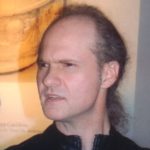Murder has almost vanished from the spectrum of human existence. Not from any elevated moral sense or spiritual refinement, but merely because it is no longer true that dead men tell no tales.

The afternoon is bright and warm, and the terraces of the glittering vertical architecture of New Johannesburg are thronged with passers-by, robots going about their tasks. I stroll in the sun, enjoying the breeze from the sea, and the peace seems inviolate. I barely remember my original name, I must consult my files, but at the moment the detail is not important. There is someone I must meet, but my heart is ambivalent. Will I thank this person, or twist his head off with the hydraulic power hidden beneath svelte, ebon arms?
Toward the end of the 23rd century, the human race has spread across the stars, our vessels have touched over a hundred new worlds, and Old Earth is shaking free of the devastation of its past. Population is a fraction its old levels, while technology has redressed many a shortcoming. And among the utopic inventions of a race new-born to the universe are the many strategies by which death has ceased to be a certainty.
Death came for me in an accident, the failure of a sub-runner, one of the bullet trains which streak across the world by magnetic induction in vacuum tunnels. The passengers were saved by the many failsafes, but I was unlucky to be in the way of a collapsing stanchion as the mass of the passing Cairo-New Jo’burg express shook plascrete and reinforced alloys to pieces. I was told afterward there had been no time in which to suffer. A quick, clean exit.
It was only later I discovered there had also been doubt. My body was damaged, but not beyond local systems to suspend and repair. Eyebrows were raised in some circles, reviews promised, but I heard nothing more; until a concerned doctor passed me the confidential finding that the supervising medical technician had not pursued the possible options but selected immediate cyber-incarnation.
Cyber-incarnation is the standard fallback by law, in which the personality is downloaded from the chemical matrix of the brain and stored, pending reanimation in any of the available prostheses—cyborg, android, hardlight hologram, whatever the individual prefers. Only the rich can afford their own new body, of course, the rest of us make do with a time-share arrangement, and while it’s sometimes inconvenient, there are consolations.
Yesterday I was a surfer riding high, glassy walls coming down on the ocean beaches; the day before, I delighted in music, accessing hardwired routines in the hologram I phased with–I never played piano before but certainly want to again. Today I am in a body I would have envied before my untimely passing, long and dark, and dressed to impress in flowing blues. She draws eyes and I revel in the fact no one knows who I am. Only the dead recognize each other, sensing the simulacra we have become, and trade knowing smiles as we pass, for we are now an elite.
I see the one I’m after, taking a seat at an outdoor café at the foot of the cliff of glass fronting a hotel, its landing pads high above throwing cool shade; this is his lunch hour between shifts. I walk with confidence, the strike of my heels almost lost in the sounds of strolling people, until I slide into a seat opposite and hold his eyes silently. He is not unhandsome, fair hair thick above a strong-boned skull with firm jaw; indeed his rejuvenation is superb, retarding his 120 years to a comfortable 30, and I sense he appreciates this glove of flesh and alloys I wear. “Doctor Rensburg,” I begin, a statement.
A robowaiter hovers nearby. Rensburg softly orders tea—for two.
“You have me at a disadvantage,” he murmurs. “Isn’t that how they used to put it?”
I offer a fine hand before I smile and at last recheck—Onika, yes, that was my name. “Onika Kabila.”
He frowns, clearly not recalling. “Have we met?” He grins now. “I’m sure I would remember one so charming.”
I flash him the smile his words earn, then sit back to stare off at the sea as the drone returns with fine china and a glass pot. When we cradle cups of fragrant blend, I have made up my mind. After all my soul-searching, I will not kill him.
Instead I raise my cup in salute. “Thank you,” I whisper, my smile suddenly very genuine. “You could have dropped me back into my living body but you prematurely reassigned me. I know you earn a gratuity from the cybernetics manufacturers for every patient you send into hard-backup, keeping the android industry in full swing, and for a long time I meant to kill you for it.” His eyes widened and my electronic senses see pulses race, pupils dilate, a dozen other tells. “But they would only pour you back onto another harddrive, and I’m not so hate-filled I would destroy your brain entirely to prevent it.” My stare holds his eyes like glass knives as he pivots upon the uncertainty of the instant. “But you know what? I like where I am now. It’s not so different, and better in some ways.” I sip again, then rise, lean across the table and speak softly by his ear. “So I’ll wish you good luck and long life, but hope you’ll leave the choice to your patients in future.”
I rise and walk on in the sun, losing myself among the crowd on the terraces, and know Rensburg is trembling with shock, a very human thing of which I am no longer capable. But that’s a small price to pay.
Because I have learned that life really does begin at the end.
This story first appeared in Nature Futures # 7707, May 31st, 2018.
Edited by Marie Ginga
Mike Adamson holds a doctoral degree from Flinders University of South Australia. After early aspirations in art and writing, Adamson returned to study and secured qualifications in marine biology and archaeology. He has been a university educator since 2006, is a passionate photographer, master-level hobbyist and journalist for international magazines. For more about him, check out his website, The View From The Keyboard.

